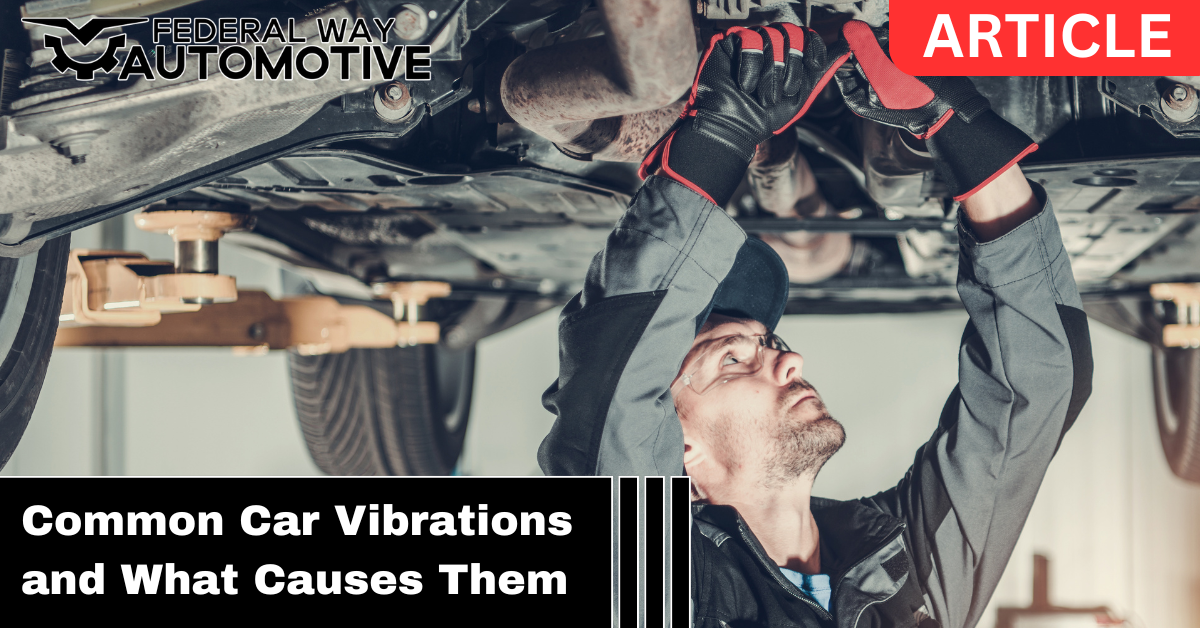You know that uneasy feeling when your car starts to shake or buzz in ways it shouldn’t? Maybe it’s a light tremor through the steering wheel, a rumble in your seat, or a persistent vibration that makes your mirror blur at highway speeds. Whatever the case, those vibrations aren’t just annoying — they’re your car’s way of calling for attention.
Vibrations can come from dozens of sources — tires, brakes, suspension, or deeper in the drivetrain. Sometimes they’re harmless, like a simple wheel balance issue. But other times, they hint at worn parts such as a CV axle, motor mount, or transmission mount that could fail if ignored.
At Federal Way Automotive, we hear this complaint almost daily: “My car shakes when I drive.” The good news? Once you know what kind of vibration you’re feeling and when it happens, you’re halfway to finding the cause.
Let’s break down the most common types of car vibrations, what they mean, and when it’s time to schedule professional auto repair before a minor shake becomes a major problem.
Why Vibrations Shouldn’t Be Ignored
Every driver can feel when something’s off. A healthy car should run smooth — you should barely feel the engine at idle and your steering wheel should stay steady even on the freeway. When vibration creeps in, it’s a clue that something mechanical is unbalanced or worn.
Ignoring it can increase wear on tires, suspension, and bearings, shorten the life of drivetrain components, lead to higher fuel consumption, and turn a small fix into an expensive repair later on.
The first step is to pay attention: When does the shaking happen? During acceleration? At high speeds? Only at idle? Each of those patterns points in a different direction.
1. Vibrations While Driving at Speed
You’re cruising at 60 mph, the road looks clear — but your steering wheel starts to shimmy, or your seat begins to buzz. That’s one of the most common vibration complaints we see, and it usually traces back to the wheels and tires.
What’s happening: unbalanced wheels, a bent rim, or uneven tire wear. Even a few grams of imbalance can cause shaking at higher speeds. Over time, this can wear down your steering and suspension. Hitting a pothole can bend a rim, while poor alignment leads to uneven tire wear that transfers vibration through the chassis.
How it feels: the steering wheel vibrates most between 50–70 mph, the shaking fades at lower speeds, and the car feels “nervous” on smooth pavement.
A simple tire balance and rotation often solves this problem. At Federal Way Automotive, we use precision balancing tools to ensure smooth performance. If rims are bent or alignment is off, we’ll recommend the right correction so you can enjoy a steady ride again.
2. Vibrations When Accelerating
If your car shakes more the harder you press the gas pedal, the issue probably lies in your drivetrain — often the CV axle or one of your motor mounts.
Worn or Damaged CV Axle
The CV axle connects your transmission to your wheels and allows them to move up and down while still transferring power. When the protective rubber boots crack, grease escapes and dirt gets in.
How it feels: the car shudders most during acceleration, you might hear a clicking sound when turning, and the vibration eases when you take your foot off the gas.
If left unchecked, a bad CV axle can snap completely — and your car will no longer move. Replacing it early prevents bigger headaches later.
Broken or Worn Motor Mounts
Your engine doesn’t sit directly on the frame — it’s held in place by motor mounts that cushion vibration. When these mounts crack or collapse, you’ll feel every movement of the engine.
How it feels: vibration at idle that gets worse when accelerating, a heavy clunk when shifting from reverse to drive, and a subtle rocking motion when starting or stopping.
Replacing worn motor mounts restores smoothness and comfort and prevents stress on exhaust and wiring connections that move with the engine.
3. Vibrations at Idle
When your car shakes while stopped at a red light but runs fine once you move, it’s often one of two things: a rough-running engine or a failing motor or transmission mount.
Possible culprits include dirty fuel injectors, misfiring spark plugs, or a cracked mount that transfers engine movement into the cabin.
You may feel the vibration in your seat or steering wheel while in park or drive, and the engine might seem to stumble or run unevenly.
Sometimes a tune-up — new spark plugs, cleaned injectors, or fresh filters — smooths things right out. If the engine runs fine but the shaking persists, the mounts may be the issue. Our technicians at Federal Way Automotive check both to ensure you get the right fix the first time.
4. Vibrations When Braking
If the steering wheel shakes when you hit the brakes, your brake rotors are likely warped or uneven. This happens when the metal heats and cools repeatedly, eventually distorting the surface.
You might notice your steering wheel tremble, the brake pedal pulse, or your braking feel inconsistent. Warped rotors reduce stopping power and can wear down brake pads unevenly. Replacing or resurfacing them — along with checking for sticky calipers — brings smooth, confident braking back to your car.
Avoid riding your brakes downhill; shift into a lower gear and let the engine help control your speed.
5. Vibrations at Specific Speeds
Ever notice a shake that happens only around 45 or 65 mph and then disappears? That’s a telltale sign of balance or tire problems.
Common reasons include slight imbalance in tire weights, internal tire defects, or minor driveshaft imbalance on rear-wheel-drive vehicles.
Start with the simplest fix — rebalance and rotate your tires. If the vibration remains, we’ll inspect your driveline and suspension for worn joints or bearings.
6. Vibrations When Shifting Gears
If your car shudders when you shift from park to drive or feels rough switching gears, your transmission mount might be the cause.
Transmission mounts hold your transmission steady under the torque of acceleration. When they wear out, they allow movement that creates harsh shaking through the body.
You might notice a jolt or clunk when shifting, vibration that grows as you accelerate, or the engine seeming to jump slightly when revved.
Replacing a transmission mount restores the smooth transition between gears and prevents stress on cables and hoses.
7. Persistent or Mysterious Vibrations
If you’ve checked tires, brakes, and mounts but your car still shakes, the issue could lie deeper — in the engine or drivetrain itself.
Other possible causes include a misaligned driveshaft, worn universal joints, or internal engine imbalance.
The vibration may happen at all speeds, get worse under load, or persist even though the car seems fine otherwise.
That’s when professional diagnosis becomes critical. At Federal Way Automotive, we use advanced diagnostic tools and road-testing techniques to pinpoint the exact cause and recommend the most efficient fix.
When Vibrations Mean It’s Time for a Shop Visit
Here’s when you shouldn’t wait:
- The vibration is getting worse or happens more often.
- It changes with acceleration, braking, or speed.
- You hear clunking, humming, or rattling sounds along with it.
- Steering or handling feels loose or unstable.
A minor tire imbalance can usually wait a few days — but drivetrain or brake-related vibrations should be addressed right away. The sooner you act, the less damage they can cause.
How to Prevent Vibration Problems
Keeping your vehicle smooth and steady isn’t complicated — it just requires regular care. Balance and rotate tires regularly, keep them properly inflated, inspect suspension and mounts yearly, replace worn CV axles, motor mounts, and transmission mounts before they fail, and schedule wheel alignments to prevent uneven tire wear.
These simple steps can save you from costly repairs and make your daily drive more enjoyable.
Trust Federal Way Automotive for Expert Vibration Diagnosis
Unwanted vibrations can make even a short commute uncomfortable — and they almost always mean something’s out of balance. Whether it’s a worn CV axle, failing motor mount, or loose transmission mount, our ASE-certified technicians at Federal Way Automotive have the experience and tools to pinpoint the cause quickly and accurately.
We’ll explain what’s happening in plain language, show you what we find, and recommend the most practical repair — no surprises, no upselling. Just honest service and a smoother, safer ride when you’re done.
Call us today or schedule an appointment online to eliminate those vibrations and restore your car’s comfort and confidence on the road.


